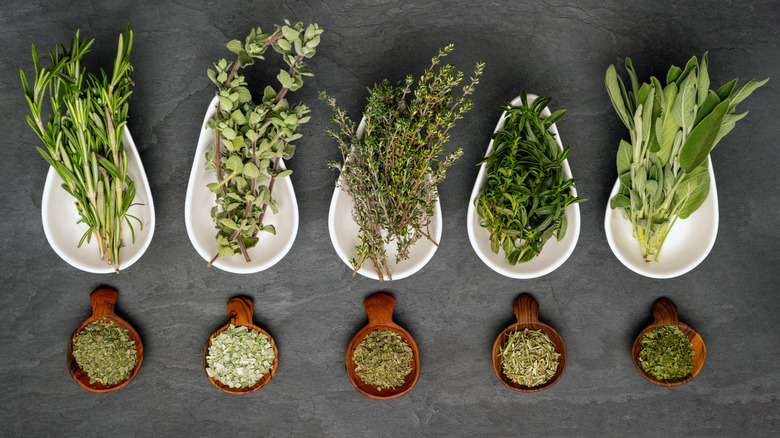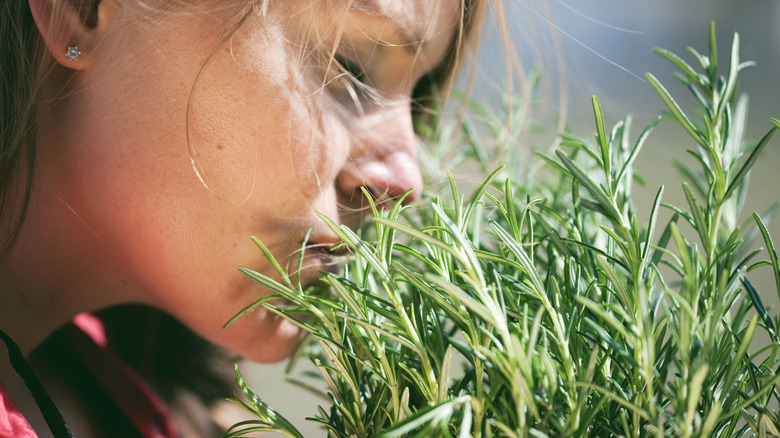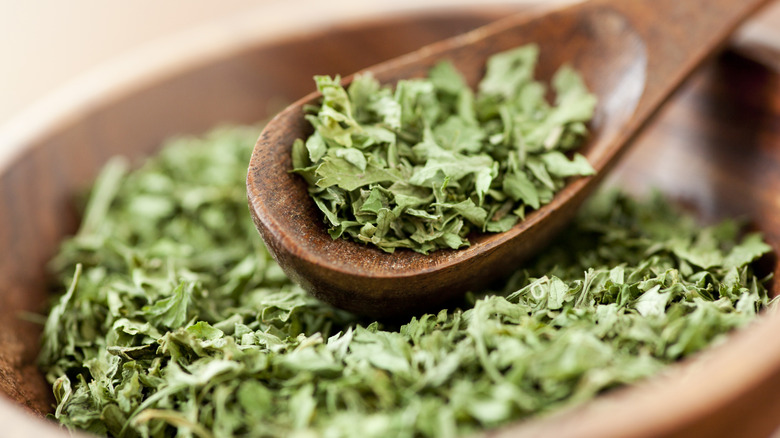When To Use Fresh Vs Dried Herbs
We may receive a commission on purchases made from links.
When you're cooking up a piece of lamb or sprucing up a store-bought pasta sauce, there's nothing better than being able to reach into the cupboard and pull out a jar of dried mint or oregano. But that sauce will taste even more homemade if you throw in a few leaves of fresh basil. When cooking a turkey, you'll likely add sprigs of fresh thyme and rosemary to the roasting pan, but dried sage works nicely sprinkled on squash or rubbed into chicken. Deciding when to use fresh herbs versus their dried counterparts is often a matter of availability or personal preference, but there are times when one makes more sense than the other.
In general, fresh herbs are most useful uncooked and added to dishes where you'll notice their texture and taste: Mixed in salads or garnishing roasted meats, for example. Or where freshness is key, as in a really good pesto. Best cooked, dried herbs work well as seasonings in soups or stews, and as part of dry rubs to get more flavor out of chicken or fish. Often fresh and dried herbs can be used interchangeably, but learning when one or the other is the best option will help ensure you're making the best meals possible.
Fresh herbs bring the wow factor
Fresh, leafy herbs add a colorful, fragrant flair to both food and drink. After all, where would a mojito or mint julep be without fresh mint? You'll find fresh herbs in the produce section, usually grouped together. Most commonly you'll see mint, parsley, cilantro, basil, dill, rosemary, and thyme. Head to a specialty store or farmers market, and you're likely to discover many more options. In general, what you do with the varieties is the same: You'll mostly use the leaves. They can be chopped, torn, or thrown in a blender to infuse your cooking with brightness and subtle aromatics. Fresh herbs will last a week or two in the refrigerator when stored properly, but you can also freeze fresh herbs in ice cubes for indefinite use.
Fresh herbs are typically best used uncooked and when a recipe specifically recommends them, whether for visual appeal or flavor. Roasted meats may call for whole sprigs to be placed in the pan, often as a finishing garnish. Chopped fine, they're an integral ingredient for building your own compound butter for steak and other dishes, or to flavor Greek tzatziki sauce. Both chimichurri and pesto are other sauces anchored by fresh, fine-chopped herbs. And tabbouleh is basically a salad of fresh herbs and bulgur wheat. A basil or shiso leaf can upgrade anything from yogurt to a cocktail, and parsley was the generic garnish of choice for restaurants for decades, but can be chopped and added to potato salad or sprinkled over eggs for a bit of zing.
Stock dried herbs for everyday cooking
While you usually need to use fresh herbs shortly after you buy them, dried herbs, stored in a cool, dry spot can last for years (though they lose their potency over time). Located on store shelves alongside spices and seasonings (there's a difference), you'll discover a massive selection to suit your various cooking needs. In addition to individual herbs, consider blends like Frontier Co-op's herbs de Provence, which adds a French accent to anything you're cooking. Accordingly, the big advantage of dried herbs is convenience. Grab a bottle each time you head to the store and soon you'll have a well-stocked cupboard of flavor and aroma options. In addition to the aforementioned spice rubs, dried herbs are reliably added to soups and stews, or used to spruce up instant sauces like Campbell's Spicy Thai Curry.
In general, dried herbs have more kick when you're cooking. Where fresh herbs might wilt or singe in a pan or oven, dried herbs give the dish more flavor and aromatic notes when heated. If you're substituting dried herbs for fresh in a recipe, you'll generally use three times as much fresh herbs as dried to achieve the same effect. Not well suited for garnishing a dish, when dried herbs are just sprinkled on top of something, however, they can taste a bit musty and dull. One way to counter this is to temper or bloom your herbs for more flavor before adding them to your dishes.


